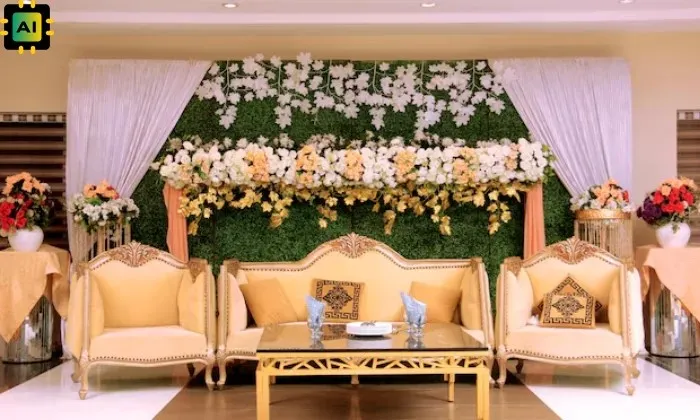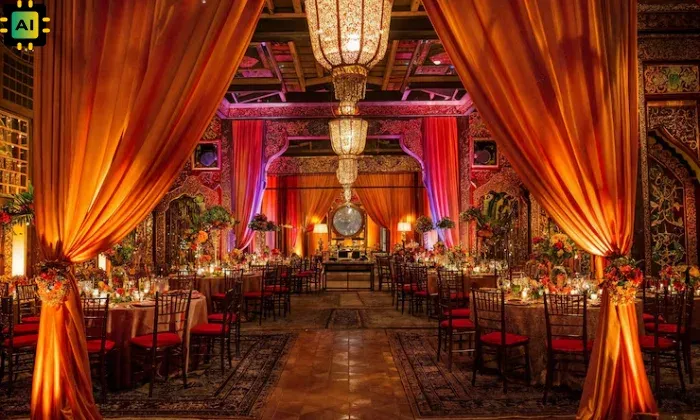Understanding the Nikah Ceremony: A Sacred Union in Islamic Tradition
 Wedding Planning
Wedding PlanningUnderstanding the Nikah
Ceremony: A Sacred Union in Islamic Tradition
The Nikah ceremony is one
of the maximum vital rituals in Islam, which now not handiest symbolizes a
prison bond among a husband and spouse, but also a religious covenant to Allah.
For many people, it's far a mixture of existence cooperation, love, dedication
and religious obligations. While the wedding is different in worldwide culture
and customs, Nikah is still a unique ceremony with deep inherent traditions,
meaning and responsibility. This blog examines the essence of Nikah, its
history, opinion, processes, benefits, challenges and frequent questions, which
provide a complete guide to those who want to understand this sacred ritual.
What is Nikah?
Nikah, derived from
Arabic, literally means "marriage". In Islam, there is a serious and
sacred contract between a man and a woman who will live together according to
the principles of Islam. This is not just a social agreement, but a spiritual
commitment that ensures respect between mutual rights, responsibilities and
spouse. Unlike traditional weddings that emphasize the celebration, Nika
prioritizes consent, legal obligations and moral grounds for marital life.
Historical meaning of
nikah
Nika's tradition is from
Prophet Muhammad (peace on him) and the time of the early Islamic community.
Historical items suggest that marriage in Islam was kept with simplicity, which
emphasized the spiritual tape of waste. The Prophet urged Muslims to marry to
maintain social stability, moral behavior and family structure. For centuries,
while there was diversity in cultural practice, the main principles of Nikah
remained unchanged: consent, clarity on the marriage contract and obligation to
Islamic doctrine.
Why the Nikah ceremony is
required
The Nikah ceremony is
required for several reasons:
Religious areas of
responsibility: Marriage is considered a Sunnah
(practice) of the Prophet, and Nikah formalizes Sangh under the Islamic Law.
Legal validity:
This provides a valid therapist for the relationship, which is preserved to
ensure both partner's rights and responsibilities.
Ethical and social
stability: Nika helps prevent social issues such as illegitimate conditions, by
formaling the relationship and ensuring that children have recognized family
structures.
Spiritual importance: The
ceremony emphasizes mutual respect, cooperation and moral behavior, which meets
the spiritually married life.
Components and procedure
for a Nikah ceremony
The Nikah ceremony is
simple, but is usually kept in the presence of family, friends and witnesses.
Large components include:
Consent:
Both sides should voluntarily agree to marry without any strength. Consent is
the cornerstone of Nikah.
Mahar
(dowry): The bride is a symbol of a mandatory gift, honor, responsibility and
commitment to the bride. It may agree with monetary or in any form from both
sides.
Witness:
At least two adult Muslim witnesses are required to validate Nikah.
Khutbah
(sermon): Often it provides crime -determined imam a small doctrine to
highlight the responsibility for married lives in Islam.
Signing Nika Nama
(marriage contract): The contract emphasizes rights,
obligations and agreed on Mahr. Both sides, along with witnesses, signed to
make the marriage an officer.
DUA and blessings:
The conclusion of the ceremony, beans are recited for courage, health and
spiritual development of the couple.
The importance of Nikah
in Islam
Nikah is more than a
formal ceremony; It is a stable family and the basis for society. Its meaning
includes:
Ethical life:
encourages couples to maintain moral values and responsibilities.
Gjensidige rights:
clearly defines economic, emotional and legal rights.
Spiritual tape:
A strengthening of the relationship with Allah through a religious fulfillment.
Social recognition:
It ensures that marriage is social and legally recognized.
Professionals in a
marriage rite
Legal safety:
Ensures rights for inheritance, renovation and marital duty.
Spiritual achievement:
Adjusting marital lifestyles with Islamic doctrine, promotes spiritual concord.
Social popularity:
identified with the aid of family, society and felony government.
Emotional stability:
to sell self -self belief, recognize and mutual understanding among partners.
Resistance or challenges
with a wedding rite
Cultural false impression:
Can purpose confusion approximately inter -strategies in traditions.
Financial strain:
When they may be now not mandatory, a few households feel social stress to
operate extraordinary weddings.
Legal complexities:
In instances of divorce or disputes, it becomes essential to apprehend the
nuances of the agreement.
Consent questions:
It is essential to make certain voluntary consent; Forced Nikah under the
Islamic Law.
Unique traditions and
innovations in modern marriage ceremonies
While the essence of
Nikah remains traditional, modern couples often include creative and innovative
touch:
Destination Nikah:
Conduct the ceremony in religious places that keep religiously obedient.
Digital Nikah:
Online ceremony for separate families from distance, now recognized in some
countries.
Environmentally friendly
function: to reduce extraordinary, moral gifts and emphasis on
sustainable practice.
Interfath Awareness:
To clarify Nikah processes for mixed cultural backgrounds that respect Islamic
principles.
FAQ
Q1. Can Nikah be run
without witnesses?
Two adult Muslim
witnesses are compulsory to validate the marriage contract.
Q2. What is the minimum
in Nikah?
There is no fixed
minimum; It must be mutually agreed and symbolizes commitment.
Q3. Can women start
nikah?
Yes, women have the right
to consent and request certain conditions in the Nikah contract.
Q4. Is Nikah valid
without a ceremony?
There are contracts and
consent core; However, a formal function ensures legal and social recognition.
Q5. Can Nikah be
repeated?
Yes, under specific
circumstances, especially in cases of cramps or remarriage.
Q6. Nikah needs to live
with Muslims?
Yes, cohabitation without
marriage is considered impenetrable in Islam.
Q7. Can you participate
in non-Muslim Nikah?
Witnesses should be adult
Muslims; Others may participate socially, but cannot validate the contract.
Q8. What happens if Mahr
is not paid?
This is a legal
obligation; Failure to pay can have religious and legal consequences.
Q9. Is it necessary to
have a big marriage?
No, Islam encourages
simplicity; The ceremony can be minimized as long as the contract is valid.
Q10. Can Nika contract
include special conditions?
Yes, as long as they
follow Islamic law, the man and wife can be included.
Aslo Read
Mandap Decoration
Ideas for Every Budget
Choosing the Right
Color Palette for Your Wedding
How to Create a
Custom Wedding Menu That Fits Your Budget
Creative Stage
& Mandap Decoration Ideas for Weddings
Instagram:- www.instagram.com/dreamweddinghub
Blog Category
Popular Blogs
-min.webp)
Top Bridal Entry Ideas: Unique and Memorable Ways for Indian Brides
5 Jul, 2024

10 Unique Couple Outfit Colors for Sangeet Ceremony
2 Aug, 2025

Marriage Home in Alwar: Dream Wedding Hub
4 Nov, 2025
.webp)
Best Wedding Venues in Alwar : Dream Wedding Hub
25 Oct, 2025

Best Wedding Venues In neemrana (alwar)
31 Oct, 2025

Harmonies of Love Top Trending Wedding Songs in 2025
9 Oct, 2025
.webp)
Best Wedding Venues in Rajgarh : Dream Wedding Hub
31 Oct, 2025

Wedding Venue in Bassi (Jaipur) : Dream Wedding Hub
23 Oct, 2025

Wedding Venue in Malviya Nagar (Jaipur): Dream Wedding Hub
23 Oct, 2025
 (1).webp)
Best Wedding Venues in Alwar
25 Oct, 2025